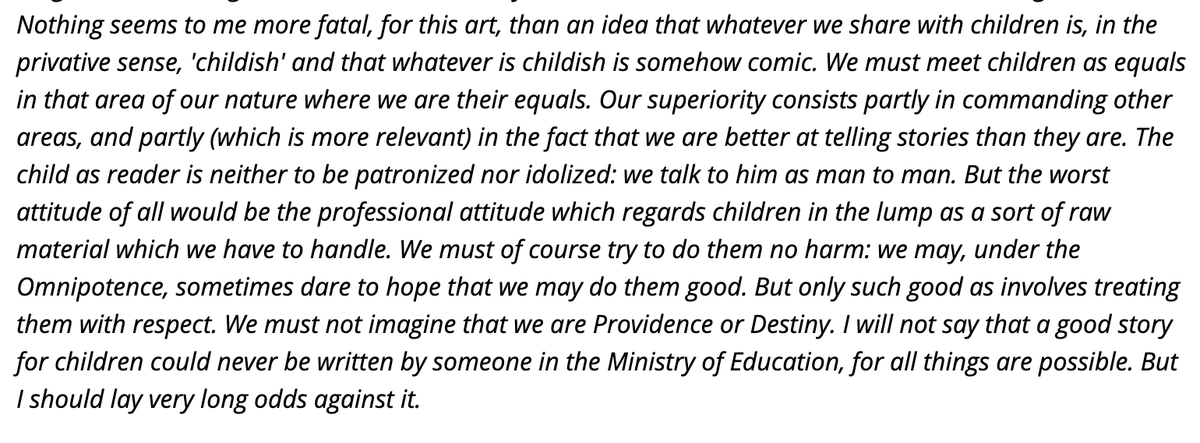Tweety
- Tweety, aktuální stránka.
- Tweety a odpovědi
- Média
Zablokovali jste uživatele @corymassimino.
Opravdu chcete tyto tweety zobrazit? Zobrazením tweetů nedojde k odblokování uživatele @corymassimino.
-
Připnutý tweet
It looks like the forthcoming Routledge Handbook of Anarchy and Anarchist Thought, in which I have a chapter called Two Cheers for Rothbardianism, has a cover. Neat! The book is expensive, so let me know if you want a copy of my chapter. https://www.routledge.com/The-Routledge-Handbook-of-Anarchy-and-Anarchist-Thought/Chartier-Schoelandt/p/book/9781138737587 …pic.twitter.com/3Xogz5nH2V
 Děkujeme. Twitter tuto informaci použije ke zlepšení vaší časové osy. VrátitVrátit
Děkujeme. Twitter tuto informaci použije ke zlepšení vaší časové osy. VrátitVrátit -
Retweetnuto uživatelem Cory
Find someone who looks at you like Bluebell looks at my most prized and fragile Christmas ornamentspic.twitter.com/kstPp5BGPs
 Děkujeme. Twitter tuto informaci použije ke zlepšení vaší časové osy. VrátitVrátit
Děkujeme. Twitter tuto informaci použije ke zlepšení vaší časové osy. VrátitVrátit -
Retweetnuto uživatelem Cory
Winter Light (1963) Director: Ingmar Bergmanpic.twitter.com/8p6EP0V3QZ
 Děkujeme. Twitter tuto informaci použije ke zlepšení vaší časové osy. VrátitVrátit
Děkujeme. Twitter tuto informaci použije ke zlepšení vaší časové osy. VrátitVrátit -
Retweetnuto uživatelem Cory
I was today-years old when I realized "Frosty the Snowman" is a morality tale about mortality and the ephemerality of (created) being. How old were you?
Děkujeme. Twitter tuto informaci použije ke zlepšení vaší časové osy. VrátitVrátit -
i was extremely excited for the recent biopic on "Breathless" star, black panther supporter, and victim of FBI harassment jean seberg.... until i watched it and her whole life was reduced to fodder for the totally made up "sympathetic" fbi agent harassing her
Děkujeme. Twitter tuto informaci použije ke zlepšení vaší časové osy. VrátitVrátit -
"If you're a leftist who doesn't put your wallet where your mouth is, you're just a hypocrite." "If you're a leftist who does put your wallet where your mouth is, you're just posturing."https://twitter.com/mattyglesias/status/1332427763257667593 …
Děkujeme. Twitter tuto informaci použije ke zlepšení vaší časové osy. VrátitVrátit -
Retweetnuto uživatelem Cory
Anarchism is just being anti-slavery but consistently
Děkujeme. Twitter tuto informaci použije ke zlepšení vaší časové osy. VrátitVrátit -
Retweetnuto uživatelem CoryDěkujeme. Twitter tuto informaci použije ke zlepšení vaší časové osy. VrátitVrátit
-
This January-February I'm running a Virtual Reading Group with
@RoderickTLong on Individualist Anarchism in 19th-Century America. Apply here:https://docs.google.com/forms/d/1dEx64m1FgeRGo0_0cUki2P5TvDae7L6J0M-CdAbbm5w/edit …Děkujeme. Twitter tuto informaci použije ke zlepšení vaší časové osy. VrátitVrátit -
Retweetnuto uživatelem Cory
Some excellent points by
@anarchakelly here.@nonserviammedia continues to offer amazing content on important anti-authoritarian ideas.https://www.youtube.com/watch?v=7f4LZP0gmcw …Zobrazit toto vláknoDěkujeme. Twitter tuto informaci použije ke zlepšení vaší časové osy. VrátitVrátit -
In the Routledge Handbook of Anarchy & Anarchist Thought I combine relational egalitarianism w Rothbardianism (natural law, individualist anarchy, liberal class theory, austrian econ). I spoke w:
@nonserviammedia https://www.youtube.com/watch?v=pqAVQ7mFy5o&ab_channel=NonServiamMedia …@FreeThoughtsPodhttps://www.youtube.com/watch?v=kK6AKM0lc4U&ab_channel=Libertarianism.org …Děkujeme. Twitter tuto informaci použije ke zlepšení vaší časové osy. VrátitVrátit -
I tend to think the exact opposite: it's the material comfort we've managed to achieve that in part makes space for rich intellectual lives.https://twitter.com/tylerwittman/status/1332365782349713409 …
Děkujeme. Twitter tuto informaci použije ke zlepšení vaší časové osy. VrátitVrátit -
Retweetnuto uživatelem CoryDěkujeme. Twitter tuto informaci použije ke zlepšení vaší časové osy. VrátitVrátit
-
Retweetnuto uživatelem Cory
So evidently our 13 year old thought "primadonna" meant anyone born before Madonna (i.e. pre-Madonna). Please send oxygen. We cannot stop laughing.


 Zobrazit toto vláknoDěkujeme. Twitter tuto informaci použije ke zlepšení vaší časové osy. VrátitVrátit
Zobrazit toto vláknoDěkujeme. Twitter tuto informaci použije ke zlepšení vaší časové osy. VrátitVrátit -
Retweetnuto uživatelem Cory
"The abolitionist framework keeps our ultimate goal front and center at all times, which avoids the pitfalls of the pure policy approach and reveals social change to be an entrepreneurial, collaborative, and spontaneous process." -
@corymassiminohttps://c4ss.org/content/43896Děkujeme. Twitter tuto informaci použije ke zlepšení vaší časové osy. VrátitVrátit -
Retweetnuto uživatelem Cory
I tell my cat “I know” whenever she meows but I’m gonna be honest, I have no fucking idea
Zobrazit toto vláknoDěkujeme. Twitter tuto informaci použije ke zlepšení vaší časové osy. VrátitVrátit -
Retweetnuto uživatelem Cory
Krugman has said this many times. I never get the sense that he’s as embarrassed about it as he should be— not because of any problem with Foundation or SF inspiration but because of the horrible character of what it means he thought econ was, & of what he aspired to.https://twitter.com/paulkrugman/status/1332292534610096130 …
Zobrazit toto vláknoDěkujeme. Twitter tuto informaci použije ke zlepšení vaší časové osy. VrátitVrátit -
Retweetnuto uživatelem Cory
"Unjust hierarchies" is one of the most obviously pernicious phrases in existence, every anarchist instantaneously recognized what that was smuggling in. However, I will also say that I think it's better to speak in terms of domination & freedom, than "hierarchy" per se.
Zobrazit toto vláknoDěkujeme. Twitter tuto informaci použije ke zlepšení vaší časové osy. VrátitVrátit -
Retweetnuto uživatelem Cory
C.S. Lewis has a good essay on this with respect to fairy tales (people often only quote the first part, but there are some really good parts farther in) https://www.catholicculture.org/culture/library/view.cfm?recnum=9117 …pic.twitter.com/sNnOkZ9BUh



 Děkujeme. Twitter tuto informaci použije ke zlepšení vaší časové osy. VrátitVrátit
Děkujeme. Twitter tuto informaci použije ke zlepšení vaší časové osy. VrátitVrátit -
Retweetnuto uživatelem CoryDěkujeme. Twitter tuto informaci použije ke zlepšení vaší časové osy. VrátitVrátit
-
Děkujeme. Twitter tuto informaci použije ke zlepšení vaší časové osy. VrátitVrátit
Načítání se zjevně nějak vleče.
Možná je překročena kapacita Twitteru nebo došlo k momentálnímu zablokování. Zkuste to znovu nebo se podívejte na stavovou stránku Twitteru, kde najdete další informace.























